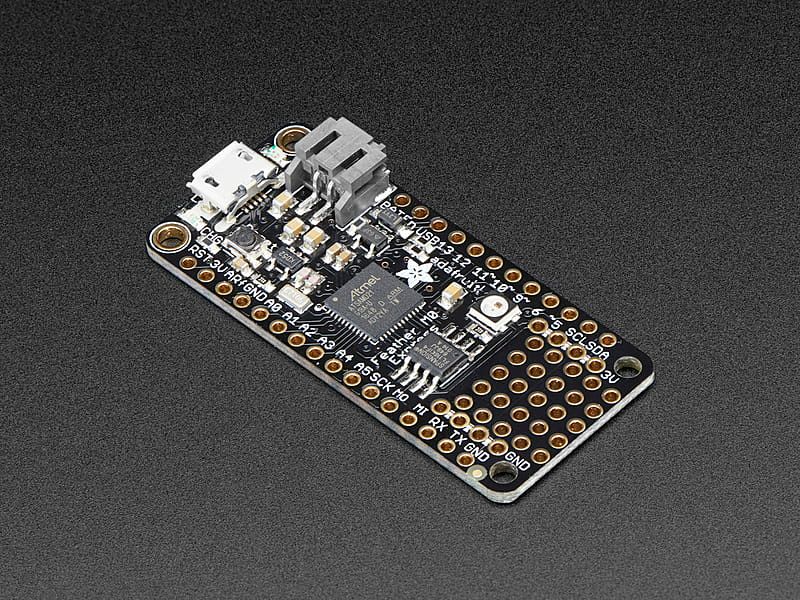
Feather M0 Express by Adafruit
The Adafruit Feather M0 Express was one of the first development boards designed for CircuitPython by Adafruit. Unlike the original Feather M0 Basic, it added a NeoPixel status LED and external 2 MB SPI Flash for storing CircuitPython code.
It is a great entry into the Feather ecosystem with CircuitPython. However, it is now out performed by the Feather M4 Express which has a faster microcontroller with more RAM. The additional RAM allows CircuitPython to load more code all at once than this Feather M0 Express can. Check out the other boards in the Feather family.
Technical details
- Measures 2.0” x 0.9” x 0.28” (51 mm x 23 mm x 8 mm) without headers soldered in
- Light as a (large?) feather - 5 grams
- TSAMD21G18 @ 48 MHz with 3.3V logic/power
- 256 KB of FLASH + 32 KB of RAM
- No EEPROM
- 32.768 kHz crystal for clock generation & RTC
- 3.3 V regulator with 500 mA peak current output
- USB native support, comes with USB bootloader and serial port debugging
- 20x GPIO pins (PWM outputs on all pins)
- Hardware Serial, hardware I2C, hardware SPI support
- 6 x 12-bit analog inputs
- 1 x 10-bit analog ouput (DAC)
- Built in 100 mA lipoly charger with charging status indicator LED
- Pin #13 red LED for general purpose blinking
- Power/enable pin
- 4 mounting holes
- Reset button
Tutorials
Purchase
Contribute
Have some info to add for this board? Edit the source for this page here.
CircuitPython 10.1.3
This is the latest stable release of CircuitPython that will work with the Feather M0 Express. Use this release if you are new to CircuitPython.
Modules included in this download
adafruit_pixelbuf analogio array audiobusio audiocore audioio board builtins busdisplay busio busio.SPI busio.UART collections digitalio displayio epaperdisplay fontio fourwire i2cdisplaybus locale math microcontroller neopixel_write nvm onewireio os paralleldisplaybus pulseio pwmio random rotaryio rtc storage struct supervisor sys terminalio time touchio usb_cdc usb_hid usb_midi warningsFeatures: Feather-Compatible, Battery Charging, Breadboard-Friendly
CircuitPython 10.2.0-alpha.1
This is the latest development release of CircuitPython that will work with the Feather M0 Express.
Alpha development releases are early releases. They are unfinished, are likely to have bugs, and the features they provide may change. Beta releases may have some bugs and unfinished features, but should be suitable for many uses. A Release Candidate (rc) release is considered done and will become the next stable release, assuming no further issues are found.
Please try alpha, beta, and rc releases if you are able. Your testing is invaluable: it helps us uncover and find issues quickly.
Release Notes for 10.2.0-alpha.1
Modules included in this download
adafruit_pixelbuf analogio array audiobusio audiocore audioio board builtins busdisplay busio busio.SPI busio.UART collections digitalio displayio epaperdisplay fontio fourwire i2cdisplaybus locale math microcontroller neopixel_write nvm onewireio os paralleldisplaybus pulseio pwmio random rotaryio rtc storage struct supervisor sys terminalio time touchio usb_cdc usb_hid usb_midi warningsFeatures: Feather-Compatible, Battery Charging, Breadboard-Friendly
Absolute Newest
Every time we commit new code to CircuitPython we automatically build binaries for each board and language. The binaries are stored on Amazon S3, organized by board, and then by language. These releases are even newer than the development release listed above. Try them if you want the absolute latest and are feeling daring or want to see if a problem has been fixed.
Previous Versions of CircuitPython
All previous releases of CircuitPython are available for download from Amazon S3 through the button below. For very old releases, look in the OLD/ folder for each board. Release notes for each release are available at GitHub button below.
Older releases are useful for testing if you something appears to be broken in a newer release but used to work, or if you have older code that depends on features only available in an older release. Otherwise we recommend using the latest stable release.
Update UF2 Bootloader
Latest version: v3.16.0
The bootloader allows you to load CircuitPython, MakeCode, and Arduino programs. The bootloader is not CircuitPython. You can check the current version of your bootloader by looking in the INFO_UF2.TXT file when the BOOT drive is visible (FEATHERBOOT, CPLAYBOOT, etc.).
It is not necessary to update your bootloader if it is working fine. Read the release notes on GitHub to see what has been changed. In general, we recommend you not update the bootloader unless you know there is a problem with it or a support person has asked you to try updating it.
To update, first save the contents of CIRCUITPY, just in case. Then double-click the reset button to show the BOOT drive. Drag the update-bootloader .uf2 file to the BOOT drive. Wait a few tens of seconds for the bootloader to update; the BOOT drive will reappear. After you update, check INFO_UF2.TXT to verify that the bootloader version has been updated. Then you will need to reload CircuitPython.
